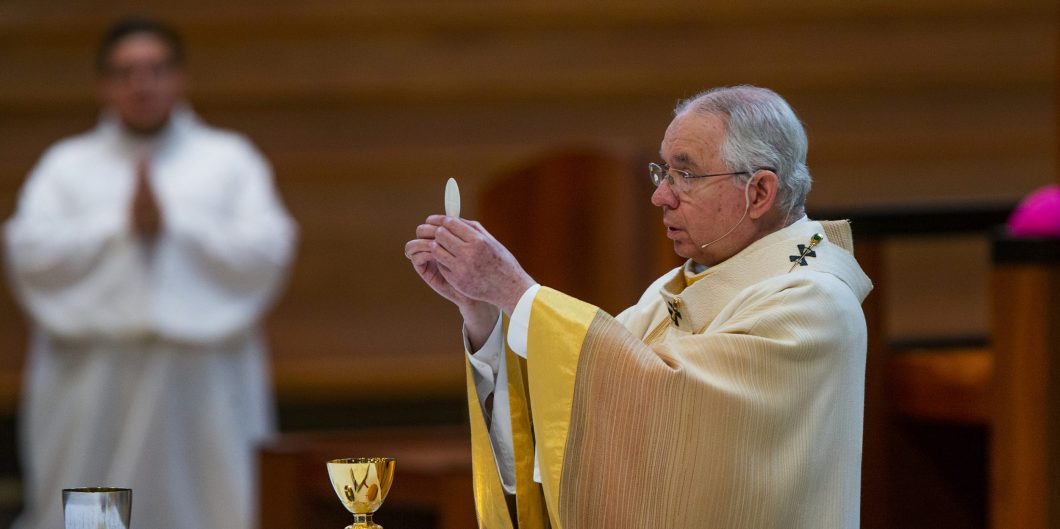Benedict always spoke of a “reason illumined by faith,” a dialogue that he believed characterized Europe at its best.
The End of Communion Détente
The salvation of souls is the supreme law of the Church, so goes the saying. It is also the last paragraph of the last law in the Code of Canon Law. It is a principle that has been lost in the debate which continues to swirl around the Catholic bishops of the United States, President Joe Biden, and the subject of who can—or should—receive Communion, and when.
At their meeting in June, the United States Conference of Catholic Bishops voted overwhelmingly to produce a draft teaching document on the Eucharist. During their hours-long debate, many of the bishops noted a loss of understanding among Catholics—perhaps even a loss of faith—in sacrament the Church calls “the source and summit of Christian life.”
They spoke about poll results, which show how few Catholics seem to profess the Church’s doctrine of the true presence of Christ in the bread and wine offered at Mass. They also spoke, some obliquely and some directly, about the problem of Catholics, including the president, who have publicly rejected the Church’s teaching on the grave immorality of abortion and yet present themselves for Communion on Sundays.
These problems are, the bishops concluded, a teaching moment which requires a teaching document, though its final form is far from agreed as yet.
Their vote was met with outrage by 60 Democratic Catholic lawmakers and sundry more-or-less expert pundits, who have accused the bishops of denying dissenting Catholics their freedom of conscience and attempting to deny them their “right” to the sacraments of the Church.
In their hubristic letter, the Members of Congress insisted that the bishops were “weaponizing the Eucharist to Democratic lawmakers for their support of a woman’s safe and legal access to abortion,” and that any move by the bishops to draw out the logical and moral cause and effect of their support for abortion on their status as Catholics would “grieve the Holy Spirit.”
“How dare the bishops,” many have asked, while accusing them of political partisanship for opening the door to a document which could restate what the Church has repeatedly said about the sinfulness of abortion. How dare they presume to judge the soul of the president, or any Catholic, and deem them “unworthy” of Communion when no one can be said to be worthy of God’s grace? How dare they presume to consider punishing the president and in doing so play politics with the sacraments?
There is, of course, a lot wrong with the premises of these questions, and missing from them is a right understanding of the Church’s “supreme law.”
The Church does claim as her “birthright” the power to coerce her members with penalties and says so upfront in Book VI of the Code of Canon Law (on penal law). As Pope Francis reminded all Catholics just weeks ago when he reissued the book, “much damage” has been done in the Church in recent decades by ignoring the need for legal consequences to “behaviors contrary to the discipline of morals, whose remedy only exhortations or suggestions are not enough.”
Otherwise, the pope warned, “such behaviors become consolidated to the point of making it more difficult to correct, and in many cases creating scandal and confusion among the faithful.”
Seen in this light, we can understand, unpleasant as it may be for some to hear, the Church’s law has to be enforced—not just for good order, but for the sake of the person in need of correction, and to prevent a bad example being emulated. All of this is basic legal theory: just law is the ordering of individual behavior for the good of the individual, and for the common good.
But, it is worth noting that while some have called for Biden and other pro-abortion Catholic politicians to be “punished,” and rather more have expressed outrage at the very idea, penal law is not what the bishops are discussing when they consider the president, or indeed any other pro-abortion Catholic politician.
Canon 916, which provides that Catholics “aware of grave sin” should not receive Communion until they have confessed their sins and received absolution, does not fall in the section on penal law at all. Similarly, canon 915 says those “obstinately persevering in manifest grave sin” are not to be admitted to Communion—but this is not a punishment for a crime. Instead, the law, which is part of the Church’s sacramental discipline, is a protective act to prevent harm, both for the individual and the community.
The Church has always taught that to receive Communion in a state of grave sin is itself a grave sin and does real spiritual harm to the person who does it. It’s not quite the same as a law saying you can’t text and drive (if nothing else, in the case of Communion for a person in a state of grave sin, there isn’t the risk of doing serious harm, it’s certain) but it’s not a million miles away either: the point of the law is protective, not punitive.
Indeed, the minister of Communion is usually a priest in his parish, not someone who can exercise the power of governance or impose a penalty.
In any just society, the Church included, law is a service to the good of the individual, and to the common good. But in a society divorced from a common idea of the good, all law becomes positivistic—lacking any force or good but the will of the legislator; if you change the law, you change the good.
Within the recent debate over Communion for politicians who have publicly broken with the Church’s most basic moral teachings, many have quoted Pope Francis saying that “Communion is not a prize for the perfect,” and noted that “we are all sinners.” Both of these are true statements, but they have been invoked in a way which obscures the reality and effects of grave sin, which is what underpins the Church’s law.
The argument, explicit or implied, that if we are all sinners and some people can take Communion, everyone should be able to take Communion is bad logic, but it is also harmful to those the law is meant to help.
Sin is not simply an action by one person against another, it is an offense against God, one which is rightly understood as the rejection of God and a reality in which we can exist, not just a thing we have done. As the Catechism puts it: “an abuse of the freedom God gives to created persons so that they are capable of loving him and loving each other.”
A wrong interpretation of the maxim that salvation of souls is the supreme law of the Church holds that if people in a state of grave sin are legally prohibited from receiving Communion, and the reception of Communion is manifestly beneficial to the salvation of souls, and the salvation of souls is the supreme law of the Church, ergo the salvation of souls is served best by ignoring or removing the legal restriction. But it doesn’t work, any more than decriminalizing any harmful behavior removes the harm by making it “legal.”
Salvation, as Pope Francis would happily tell you, does not come through canon law. But removing the legal restrictions on who can receive Communion does not change their state of grace or sin, it deprives them of a corrective to help them understand their reality, it impedes the salvation of souls.
In any just society, the Church included, law is a service to the good of the individual, and to the common good. But in a society divorced from a common idea of the good, all law becomes positivistic—lacking any force or good but the will of the legislator; if you change the law, you change the good. Coincidentally, it is this same positivist attitude that underpins many Catholic politicians’ argument for legal abortion.
What the Church teaches, and many find it harder and harder to accept, is that you can’t change the good, or save a soul, just by changing the law.



